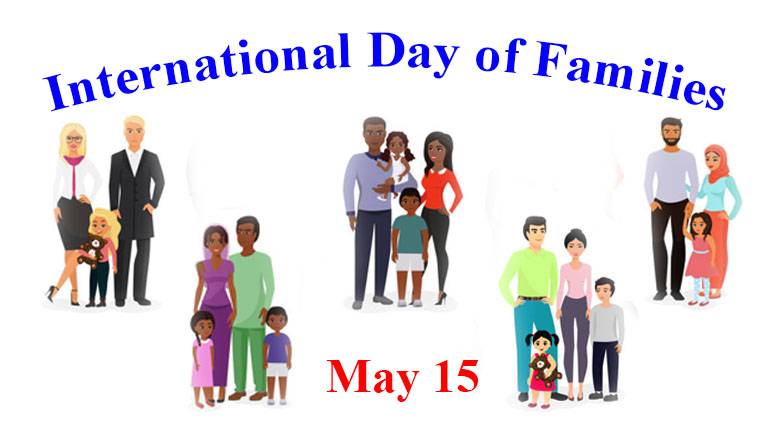International Day of Families

May 15 is the International Day of Families recognized by the General Assembly of the United Nations (UN) in 1994.
This day aims to promote awareness of issues relating to families and to increase the knowledge of the social, economic, and demographic processes affecting families.
On September 25, 2015, the 193 member countries of the United Nations consistently adopted the Sustainable Development Goals, a set of 17 goals intending to eliminate poverty, discrimination, abuse, and preventable deaths, address environmental destruction, and usher in an era of development for all people, everywhere. Families and family-oriented policies and programs are vital for the achievement of many of these goals.
According to the United Nations, the theme for the 2021 observance of the International Day of Families is “Socially just transition towards sustainable development: the role of digital technologies on social development and well-being of all.”
The theme of the year 2022 is “Families and Urbanization.”
Urbanization is one of the crucial megatrends shaping our world and the life and well-being of families worldwide.
Sustainable urbanization is connected to the achievement of several Sustainable Development Goals (SDGs) and targets, such as SDG-1 (Poverty eradication); SDG-3 (Good health and well-being); SDG-11 (Make cities and human settlements inclusive, safe, resilient, and sustainable); and SDG-10 (Reduce inequality within and among countries). These SDGs and their targets depend on how well urbanization is managed to benefit families and enhance the well-being of all generations living in cities.
This year’s theme, "Families and Urbanization", intends to raise awareness of the importance of sustainable, family-friendly urban policies.
Preparations for the thirtieth anniversary of the International Year of the Family, 2024 (IYF+30), have been focusing on megatrends and their impact on families.
The focus on selected megatrends, including technological change, migration, urbanization, demographic and climate change, aims to facilitate the analysis of their impacts on family life and to recommend responsive family-oriented policies to harness the positive aspects of those trends and counteract their negative facets.
“Family is not an important thing. It is everything,” Michael J. Fox quoted on the website of national today.
The family unit commenced with the first humans. While families may look different from what they did thousands of years ago, they are as equally important now as they were then.
Parents want to give their children the best start in life they can. The foundation generated in a family has been shown in several studies to dramatically impact a child’s success.
The more stable the family environment for a child, the more likely they will be healthier – both unseen and seen.
Communities across the world face difficulties that threaten the steadiness of the family.
The United Nations commence recognizing this in the 1980s as the Secretary-General promoted awareness among decision-makers and the public.
The UN continued to establish this day of observance and, each year, select a different family-focused theme to address worldwide challenges around education, poverty, health, and work/family balance, just to name a few.
This year on World Family Day, learn about some of the social, economic, and demographic factors impacting families around the globe and see how you can begin by strengthening your own.
In the Post-Synodal Apostolic Exhortation Amoris Lætitia (The Joy of Love) of Pope Francis, “The Joy of Love experienced by families is also the joy of the Church.”
The document continues, “As the Synod Fathers noted, for all the many signs of crisis in the institution of marriage, the desire to marry and form a family remains vibrant, especially among young people, and this is an inspiration to the Church.”
It is added in the document that “As a response to that desire, “the Christian proclamation on the family is good news indeed.”
According to the website of national today, the international family day in the numbers is as follows.
- 1 in 5 – the number of fathers who are now the primary caregiver of preschool-age children.
- 7% – the percentage of families with children that have a single father.
- 1.9 – the average number of children an American woman is expected to have.
- 33% – the percentage of free time siblings have spent together by the time they reach the age of 11 years old.
- 65% – the percentage of mothers who claim to have a favorite child—typically the oldest one.
- 70% – the percentage of fathers who claim to have a favorite child.
- 390 – the number of families who participated in a research study that found younger siblings are more rebellious and aggressive than older siblings.
- 66% – the percentage of adolescents aged 12–17 who live with both parents.
- 7% – the percentage of children under 18 who lived in a grandparent’s home in 2017.
- 82% – the percentage of children who say they value their parents’ opinion over their friends when it comes to making serious decisions.
Radio Veritas Asia (RVA), a media platform of the Catholic Church, aims to share Christ. RVA started in 1969 as a continental Catholic radio station to serve Asian countries in their respective local language, thus earning the tag “the Voice of Asian Christianity.” Responding to the emerging context, RVA embraced media platforms to connect with the global Asian audience via its 21 language websites and various social media platforms.














